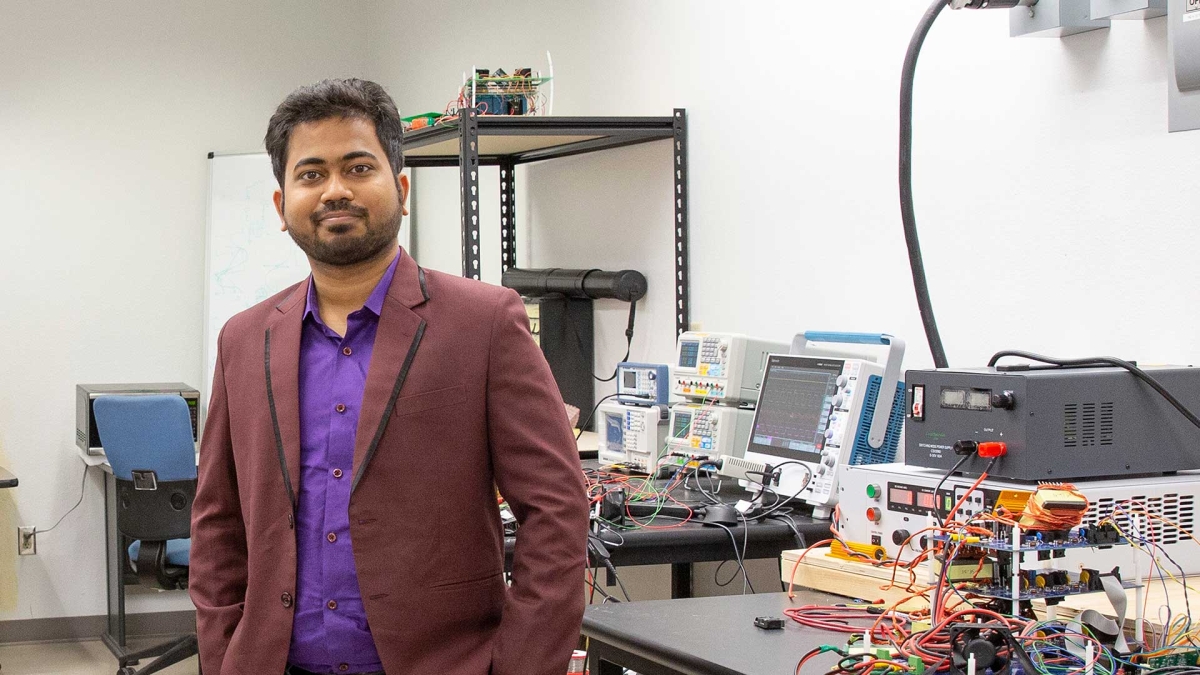CAREER Award energizes research on power conversion

Ayan Mallik, an assistant professor of electrical engineering in the Ira A. Fulton Schools of Engineering, has been awarded the 2023 National Science Foundation CAREER Award for his research on noise immunity and stability in electrical systems. Photo by Erika Gronek/ASU
Electronic devices are among the necessities of modern life. From the cellphones we use as alarm clocks to the technologies powering our transportation, electrical power is essential for society to function efficiently and productively.
This creates growing demand for new advances in maintaining and improving our power generation and distribution systems and puts a great responsibility on those who work to develop innovative ways to ensure our power sources perform more robustly and reliably.
Ayan Mallik, an assistant professor of electrical engineering in the Ira A. Fulton Schools of Engineering at Arizona State University, is among those at the forefront of these important pursuits.
Mallik has received the 2023 Faculty Early Career Development (CAREER) Award from the National Science Foundation, or NSF, for his work in advancing the characterization and mitigation of electromagnetic interference in power converter systems. Mallik will receive $500,000 over the next five years to develop software that detects flaws in electrical systems.
The award
The NSF CAREER Award is a prestigious accolade given to early career faculty who show potential to become academic role models in research and education. Mallik has been awarded grants from federal agencies, including NASA, the Department of Defense, the Army, the Office of Naval Research and the Department of Energy, and several private companies in and outside of Arizona.
But the latest award carries a special honor, Mallik said.
“This award is a great opportunity for me to add some transformative knowledge to the field,” Mallik said. “It’s going to give me a good platform to build research and publish research findings in the next five years. I will also have the opportunity to educate a lot of engineers and students. It’s exciting.”
The challenge
Mallik is taking a big picture approach to managing electrical systems by focusing on electromagnetic interference, known as EMI, which refers to the disruptions that interfere with the communication and efficacy of power conversion in electrical systems.
EMI can be caused by signals that disrupt the stability of the power converter systems. The different types of EMI cause signature electrical signals as byproducts, known as noise.
By creating an algorithm that can identify these signatures, Mallik is tackling system instability so that engineers can maximize the capabilities of an electrical system.
To develop the algorithm, researchers in Mallik’s lab will conduct a series of experiments with a range of noise generation patterns. As they develop a database of known signatures, they will also be building an algorithm that analyzes noise and connects it to known EMI.
Connor Reece, an electrical engineering graduate student in Mallik’s lab, is eager to lead the project’s technical efforts.
“The successful execution of this project would benefit the power industry significantly by reducing time-to-market and development risk for power equipment suppliers,” Reece said.
Mallik believes his project appealed to the NSF because of the prevalence of the EMI phenomenon; given that all electrical systems and radio frequencies are prone to EMI occurrences, the solution is relevant to a range of industries. By approaching the challenge through the design process, Mallik said he is circumventing countless hours and wasted resources to identify the problem early on.
The community
ASU’s interdisciplinary research environment has been instrumental for Mallik to develop a network of collaborators, both within the university and in the broader Arizona community.
“The Fulton Schools encourages faculty to collaborate across specialties as well as with both small and large businesses in Arizona,” Mallik said. “That really gives you a push to reach out to different companies and establish connections. The collaboration is really strong here.”
The CAREER Award also offers Mallik an opportunity to do outreach within the community. He intends to use a portion of the award funding for this purpose.
Mallik will open positions in his lab for undergraduate students to do capstone design projects that align with this research. He is also in talks with the ASU Preparatory Academy, ASU’s K–12 preparatory charter school, to develop summer programs that teach the basics of electrical engineering to high-school students.
Mallik said the next step in engineering education is to raise awareness of the major design challenges in the field and prepare students for how to meet energy needs in the future.
“I want to give more opportunities to the kids who are really keen to join engineering and get clarity on what this electric engineering is all about,” Mallik said.
He plans to continue testing, refine the algorithm structure and ultimately patent the EMI technology. He is optimistic about the success of the applications and impacts of EMI-identifying software and algorithms in industries that rely on power conversion systems and technologies.
“I expect this kind of approach to be adopted by many industries for power product design,” Mallik said. “EMI is a fundamental roadblock in any power converter, and this new methodology will change how we approach EMI.”
More Science and technology
2 ASU faculty elected as fellows to National Academy of Inventors
Arizona State University faculty members Bertram Jacobs and Klaus Lackner have been elected as fellows to the National…

Harvesting satellite insights for Maui County farmers
Food sovereignty can refer to having access to culturally significant foods, but Noa Kekuewa Lincoln believes it goes farther…

Google grant creates AI research paths for underserved students
Top tech companies like Google say they are eager to encourage women and members of historically underrepresented groups to…